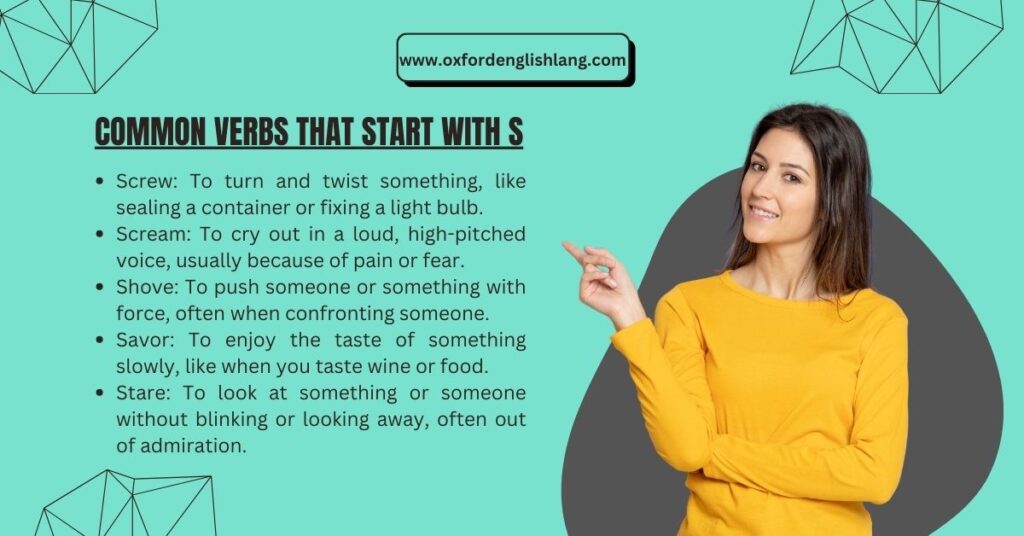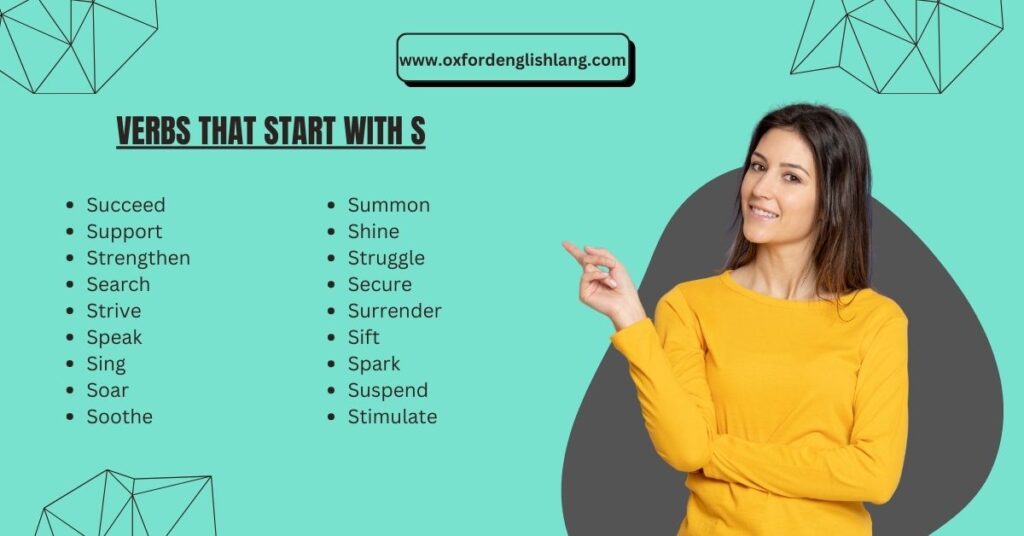Verbs that start with S bring a unique spark to our language, making sentences more impactful and lively. Whether you’re sailing through a story or trying to simplify your thoughts, these action-packed words add depth and significance.
For example, verbs like singing, shining, and strengthening help us express emotions and actions with clarity. Personally, I’ve found that using such verbs can streamline communication, especially when I need to summarize ideas or strategize for projects.
The beauty of these verbs lies in their versatility. You can use them to solve problems, support others, or even describe everyday moments like shopping, skating, or savoring a quiet evening.
When you explore their meanings, you’ll notice how they surround us in daily life, from sharing a laugh to sculpting new ideas. Their ability to sustain conversations and create connections is what makes them truly exceptional.
By incorporating these words into your vocabulary, you can add a vibrant touch to your writing. Imagine a sentence that sparkles with energy, like describing someone who sprinted across the room or someone whose smile shone like the sun.
These verbs don’t just communicate—they instill a sense of action and purpose. So, whether you’re studying, exploring, or simply embracing the power of language, verbs that start with S can transform the way you express yourself.
What Is a Verb?
In English, every sentence has a specific structure, and verbs play a vital role in it. They express either action or a state of being, typically coming after the subject and before the object.
For example, in “Sandra screamed at the ghost,” “Sandra” is the subject, “screamed” is the verb showing the action, and “ghost” is the object receiving it. This simple rule helps us understand the place of each word in the language, making communication clear and effective.
Common Verbs That Start With S

Here are some common verbs that start with the letter S and their meanings:
- Screw: To turn and twist something, like sealing a container or fixing a light bulb.
- Scream: To cry out in a loud, high-pitched voice, usually because of pain or fear.
- Shove: To push someone or something with force, often when confronting someone.
- Savor: To enjoy the taste of something slowly, like when you taste wine or food.
- Stare: To look at something or someone without blinking or looking away, often out of admiration.
- Shuffle: To walk while dragging your feet, often because of pain or tiredness.
- Substitute: To use something in place of another, like drinking tea instead of coffee.
- Sabotage: To intentionally stop someone or something from succeeding.
- Shame: To feel embarrassed or uncomfortable about something you did.

You Might also like: 101+ Commonly Used Verbs That Start With O
Action Verbs That Start With S
Here are some common action verbs that start with “S” and their meanings:
- Shave – To cut hair close to the skin using a blade.
- Scrub – To clean a surface with a stiff brush, like when you’re cleaning a sponge.
- Stir – To mix ingredients together, often when cooking or preparing food.
- Squeeze – To press something tightly, like when you squeeze a sponge to extract liquid.
- Smash – To throw something with force, causing it to break on a hard surface.
- Scare – To cause fear or make someone feel frightened.
- Shove – To push someone or something with force, often in a confrontational situation.
- Stomp – To step heavily or forcefully, often creating noise or showing anger.
These verbs are used to describe physical actions and movements that are easy to relate to everyday life.
Positive Verbs That Begin S
When we talk about positive verbs starting with S, we see how they can brighten up our sentences. Here’s a list of impactful verbs that can add meaning and emotion to your speech or writing:
- Succeed: To achieve something important or reach a goal.
- Soar: To rise high or increase quickly, often used to describe success or improvement.
- Strengthen: To make something stronger or more powerful.
- Support: To help or encourage someone or something.
- Sparkle: To shine brightly or show enthusiasm and energy.
- Shine: To glow with light or radiate positivity.
- Soothe: To calm or comfort someone, especially in times of distress.
- Savor: To enjoy something fully, especially food or a moment.
- Sing: To produce musical sounds with the voice, often associated with happiness.
- Smile: To express happiness or pleasure with a facial expression.
These verbs are not only powerful but also convey positivity and upliftment. They can bring joy, strength, and a sense of comfort to your conversations. By using them, you can brighten someone’s day and create a more positive atmosphere around you.
You Might also like: 105+ Commonly Used Verbs That Start With P
Complete List of Verbs That Start With S
Here’s a comprehensive list of verbs starting with the letter “S,” each with its meaning and an example sentence to give you a better understanding of how they are used in context. This collection includes a mix of common and unique verbs that can enrich your vocabulary.
| VERB | Meaning | Example Sentence |
| Succeed | To achieve a desired result or goal. | She worked hard to succeed in her studies. |
| Soar | To fly or rise high in the air. | The eagle began to soar above the mountains. |
| Strengthen | To make something stronger or more powerful. | Exercise helps to strengthen your muscles. |
| Support | To give assistance or help. | They always support each other in tough times. |
| Sparkle | To shine with a bright, shimmering light. | The stars began to sparkle in the night sky. |
| Shine | To emit light or glow. | Her smile can shine brighter than the sun. |
| Soothe | To calm or comfort. | The music helped to soothe her nerves. |
| Savor | To enjoy something with great pleasure. | He took a moment to savor the delicious meal. |
| Smile | To express happiness or friendliness by curving the lips. | She gave a warm smile when she saw her friend. |
| Sing | To produce musical tones with the voice. | He loves to sing in the shower every morning. |
| Screw | To turn a screw into something, or to fix with a screw. | He used a drill to screw the bolt into place. |
| Scream | To make a loud, high-pitched sound, often out of fear or excitement. | She couldn’t help but scream when she saw the spider. |
| Shove | To push something or someone with force. | He tried to shove the box into the closet. |
| Salute | To show respect by raising the hand or head. | The soldiers saluted their commander. |
| Salvage | To recover something from damage or loss. | They managed to salvage some of the furniture after the fire. |
| Sow | To plant seeds in the ground. | She decided to sow the seeds in the garden this afternoon. |
| Sponsor | To support or fund an event or person. | The company agreed to sponsor the charity event. |
| Scoop | To pick up or gather something, often with a spoon or similar tool. | He used a shovel to scoop the dirt into the wheelbarrow. |
| Solace | To provide comfort or relief. | She found solace in her friends after the breakup. |
| Sacrifice | To give up something valuable for a cause or benefit. | He was willing to sacrifice his time to help others. |
| Sanitize | To clean or disinfect something. | Make sure to sanitize the kitchen counters after cooking. |
| Smother | To cover something completely or to suffocate. | She tried to smother the fire with a blanket. |
| Shimmer | To shine with a flickering or wavering light. | The lake water began to shimmer under the moonlight. |
| Shatter | To break or destroy something into pieces. | The glass shattered when it hit the floor. |
| Swing | To move back and forth or side to side. | The children love to swing on the playground. |
| Spin | To rotate or turn around quickly. | She watched the top spin on the table. |
| Slide | To move smoothly along a surface. | The children slid down the slide at the park. |
| Swim | To move through water by using the arms and legs. | They decided to swim in the lake during the summer. |
| Search | To look for something carefully. | He began to search for his missing keys. |
| Seek | To look for or try to find something. | She went to the library to seek information for her project. |
| Sell | To exchange something for money. | He plans to sell his old books at the market. |
| Seize | To take hold of something quickly and firmly. | The police seized the stolen goods. |
| Serve | To provide food, help, or assistance. | The waiter came to serve our drinks. |
| Shake | To move something or someone back and forth. | He tried to shake the bottle to mix the contents. |
| Share | To give a portion of something to others. | She decided to share her lunch with her friend. |
| Shout | To speak or cry out loudly. | He had to shout to be heard over the loud music. |
| Show | To display or present something. | She asked him to show her the new book he bought. |
| Shrink | To become smaller in size. | The sweater began to shrink after washing it. |
| Shiver | To shake slightly, usually from cold or fear. | He started to shiver as the temperature dropped. |
| Shuffle | To move or arrange things in a disordered way. | She began to shuffle the papers on her desk. |
| Scribble | To write or draw carelessly. | The child began to scribble on the walls with crayons. |
| Scrape | To remove something by rubbing it off a surface. | He had to scrape the ice off the windshield. |
| Scratch | To mark or damage the surface by rubbing something sharp against it. | She accidentally scratched the table with a knife. |
| Scrawl | To write or draw carelessly. | He scrawled a quick note on the paper before leaving. |
| Scamper | To run or move quickly and lightly. | The rabbit began to scamper across the field. |
| Scrap | To discard or throw away something. | He decided to scrap the old project and start fresh. |
| Stamp | To press something down with force, or mark with a stamp. | She used a special stamp to seal the envelope. |
| Streak | To move quickly in a particular direction, or leave a mark. | A shooting star streaked across the sky. |
| Squint | To look at something with partially closed eyes. | He had to squint to read the small print on the document. |
| Sweeten | To make something sweeter in taste. | She decided to sweeten the lemonade with some honey. |
| Soothe | To calm or make something less intense. | The lotion helped to soothe her sunburn. |
| Safeguard | To protect or defend something. | The law was designed to safeguard citizens’ rights. |
| Sail | To travel across water in a boat or ship. | They decided to sail across the ocean to a distant island. |
| Sanctify | To make something holy or sacred. | The priest will sanctify the church before the ceremony. |
| Sanction | To approve or authorize something. | The board will sanction the new policy next week. |
| Sate | To satisfy or fulfill a need or desire. | He felt sated after eating the large meal. |
| Satiate | To satisfy fully, especially hunger or thirst. | The cold drink helped to satiate her thirst. |
| Satisfy | To meet the needs or desires of someone. | The meal did not satisfy his hunger. |
| Saturate | To soak or fill something completely. | The rain began to saturate the ground. |
| Saunter | To walk in a slow, relaxed manner. | They sauntered down the street, enjoying the warm weather. |
| Save | To keep something for future use, or rescue something. | He decided to save some money for his vacation. |
| Scintillate | To sparkle or shine brightly. | The stars scintillated in the clear night sky. |
Exploring the Power of Verbs that Start with S ( Essay )
Verbs that start with S are essential in shaping the way we express actions, emotions, and ideas. These verbs are versatile, allowing us to synthesize information, soothe feelings, and strike with precision.
For example, the verb strike can describe both a powerful action and a moment of impact, while soothe brings calm and relief. Together, these verbs show the balance between force and gentleness in language.
One of the most fascinating aspects of S verbs is their ability to synchronize different elements of communication. When we synchronize our actions or thoughts, we create harmony, just like when we stabilize a situation or a relationship.
These verbs help us structure our ideas and streamline our communication, making it clearer and more effective. Similarly, verbs like simplify and summarize help to sift through complex information, making it easier to understand.
In our daily lives, we often need to soothe or stir emotions, and S verbs offer the perfect tools for these actions. Whether we are trying to stabilize a situation or spark a reaction, these verbs allow us to express different levels of intensity.
The verb soothe can be used to describe calming someone down, while stir can mean to provoke or motivate. Both verbs show how S verbs can shape emotional experiences.
Additionally, verbs like shine, sparkle, and shimmer add a touch of beauty and excitement to language. These verbs evoke a sense of depth and emotion, helping to bring our expressions to life.
Whether describing a glowing object or a vibrant personality, these verbs create a vivid image in the mind of the listener or reader. They help to symbolize something greater, allowing us to connect with our audience on a deeper level.
Lastly, verbs like search, seek, and sustain reflect our constant drive to explore, grow, and preserve. S verbs help us express actions that push us forward, whether it’s the desire to seek knowledge, sustain progress, or search for new opportunities.
These verbs remind us of the importance of continuous effort and the vocabulary we use to describe our journey.
You Might also like: 105+ Commonly Used Verbs that Start with A
Super S-Words To Supplement the Vocabulary
Here are some super S-words to supplement the vocabulary:
- Synthesize
- Support
- Strengthen
- Sustain
- Simplify
- Symbolize
- Stabilize
- Synchronize
- Soar
- Shimmer
- Sparkle
- Subdue
- Salute
- Soothe
- Search
- Summarize
- Structure
- Survey
- Scavenge
- Streamline
- Subjugate
- Submerge
- Subvert
- Shine
- Secure
- Seek
- State
- Strive
- Showcase
- Succeed
- Spark
- Scatter
- Spread
- Stir
- Shape
- Select
- Shield
- Solve
- Sprint
- Stroll
FAQs
How do verbs that start with s Contribute to creating a sense of rhythm and flow in language?
Verbs starting with “s” create rhythm and fluidity in language by fostering seamless transitions and establishing a consistent pattern. Their soft, soothing sounds enhance harmony, making speech or writing feel smooth and coherent. Through alliteration and musicality, these verbs enrich the language, ensuring words flow naturally and maintain a unified sound that enhances speech and writing.
What are supportive words that start with S?
Supportive words like sustain, strength, and shelter convey encouragement, compassion, and understanding. They foster solidarity and reassurance in a positive environment, offering comfort and empathy. Words such as security, sympathy, and sincere express care and support, helping to encourage and uplift others in times of need.
What is a caring word that starts with s?
A caring word like support embodies compassion and the ability to navigate challenges with understanding and assistance. It makes a difference in someone’s life by showing willingness to help in difficult situations, offering encouragement, and demonstrating care. This powerful word reflects a deep commitment to helping others thrive.
How can verbals help create a sense of rhythm in a poem?
Verbals like gerunds, participles, and infinitives add variation and movement, creating rhythm and momentum in poetry. They bring a lyrical, dynamic quality to writing, enhancing the structure and breaking monotony. With their ability to add depth, resonance, and harmony, verbals enrich the flow and emotional impact of a poem, offering phrasing that feels both intricate and natural.

david Miller is an experienced English language expert with a deep passion for helping others communicate effectively and confidently. With a background in linguistics and literature, He provides clear, accessible insights on grammar, writing, and communication strategies. Through well-researched articles and practical advice, David Miller aims to make language learning both inspiring and achievable for readers of all levels.


